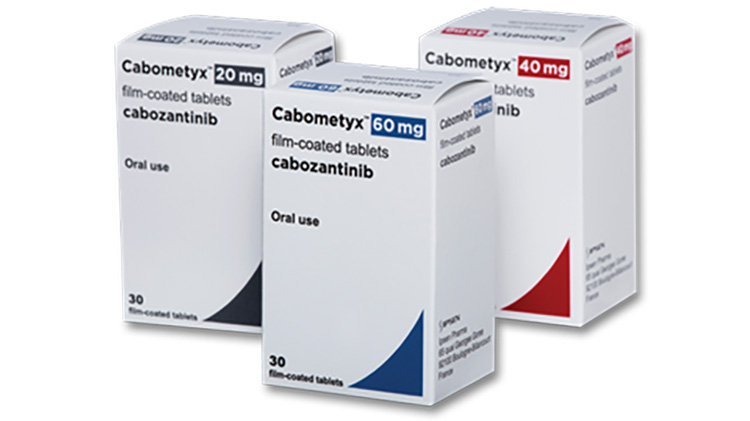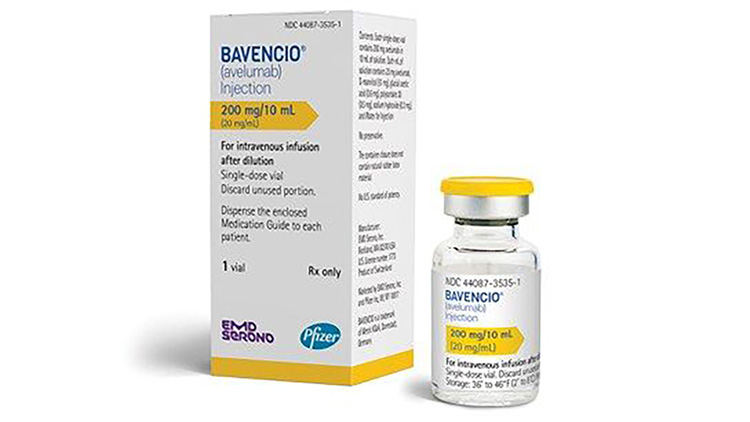Cabometyx (cabozantinib) vs Bavencio (avelumab)
Cabometyx (cabozantinib) vs Bavencio (avelumab)
Cabometyx (cabozantinib) is a tyrosine kinase inhibitor primarily used to treat various types of thyroid cancer, renal cell carcinoma, and hepatocellular carcinoma, by targeting multiple tyrosine kinases involved in tumor growth and angiogenesis. Bavencio (avelumab), on the other hand, is an immune checkpoint inhibitor that works by targeting the PD-L1 protein, enhancing the body's immune response against cancer cells, and is used in the treatment of Merkel cell carcinoma, urothelial carcinoma, and renal cell carcinoma. When deciding between the two, it is crucial to consider the specific type of cancer, the stage of the disease, the patient's overall health, and previous treatments, as each medication has distinct mechanisms of action and approved indications that a healthcare provider would tailor to the patient's individual condition.
Difference between Cabometyx and Bavencio
| Metric | Cabometyx (cabozantinib) | Bavencio (avelumab) |
|---|---|---|
| Generic name | Cabozantinib | Avelumab |
| Indications | Renal cell carcinoma, hepatocellular carcinoma, medullary thyroid cancer | Merkel cell carcinoma, urothelial carcinoma, renal cell carcinoma |
| Mechanism of action | Tyrosine kinase inhibitor | Programmed death-ligand 1 (PD-L1) blocking antibody |
| Brand names | Cabometyx | Bavencio |
| Administrative route | Oral | Intravenous |
| Side effects | Diarrhea, fatigue, nausea, decreased appetite, hypertension, etc. | Infusion-related reactions, fatigue, nausea, diarrhea, decreased appetite, etc. |
| Contraindications | Hypersensitivity to cabozantinib or excipients | Hypersensitivity to avelumab or its excipients |
| Drug class | Tyrosine kinase inhibitor | Immune checkpoint inhibitor |
| Manufacturer | Exelixis, Inc. | EMD Serono, Inc. (a subsidiary of Merck KGaA) / Pfizer Inc. |
Efficacy
Efficacy of Cabometyx (Cabozantinib) in Kidney Cancer
Cabometyx (cabozantinib) is an oral medication that has shown efficacy in the treatment of advanced renal cell carcinoma (RCC), which is the most common type of kidney cancer. Cabozantinib is a tyrosine kinase inhibitor that targets multiple receptors, including MET, VEGFR, and AXL, which are involved in tumor growth, angiogenesis, and the progression of cancer. The efficacy of Cabometyx in kidney cancer was demonstrated in the pivotal METEOR trial, a phase III clinical study that showed significant improvement in progression-free survival (PFS) and overall survival (OS) when compared to the standard therapy at the time, everolimus. Patients treated with cabozantinib experienced a median PFS of 7.4 months compared to 3.8 months for those on everolimus, indicating a strong therapeutic benefit in the treatment of advanced RCC.
Efficacy of Bavencio (Avelumab) in Kidney Cancer
Bavencio (avelumab) is a human anti-PD-L1 antibody used as an immunotherapy for various types of cancer, including kidney cancer. Avelumab works by inhibiting the programmed death-ligand 1 (PD-L1), which can be expressed on tumor cells and tumor-infiltrating immune cells, thereby helping the immune system to recognize and attack cancer cells. The JAVELIN Renal 101 study assessed the efficacy of avelumab in combination with axitinib, another tyrosine kinase inhibitor, in patients with advanced RCC. The results demonstrated a significant improvement in PFS among patients with PD-L1 positive tumors, indicating that avelumab, in combination with axitinib, is an effective first-line treatment option for patients with advanced RCC, particularly in those with PD-L1 positive tumors.
Combination Therapy in Kidney Cancer
Recent advancements in kidney cancer treatment have explored the efficacy of combination therapies. For instance, the combination of Cabometyx (cabozantinib) and Bavencio (avelumab) has been investigated for its potential synergistic effects. The rationale behind this combination is that cabozantinib may enhance the anti-tumor activity of avelumab by altering the tumor microenvironment and improving immune-mediated tumor destruction. Clinical trials have been conducted to evaluate the safety and efficacy of this combination, and early results have shown promise, with an acceptable safety profile and encouraging anti-tumor activity in patients with advanced RCC.
Conclusion
Both Cabometyx (cabozantinib) and Bavencio (avelumab), as single agents or in combination, have shown efficacy in the treatment of advanced renal cell carcinoma. These therapies represent significant advancements in the management of kidney cancer, offering hope for improved outcomes in patients with this challenging disease. The choice of therapy should be individualized based on patient characteristics, disease stage, and the presence of specific biomarkers, such as PD-L1 expression. Ongoing clinical trials continue to refine the use of these agents and explore their full potential in the treatment landscape of kidney cancer.
Regulatory Agency Approvals
Cabometyx
-
European Medical Agency (EMA), European Union

-
Food and Drug Administration (FDA), USA

-
Health Canada

-
Therapeutic Goods Administration (TGA), Australia

Bavencio
-
European Medical Agency (EMA), European Union

-
Food and Drug Administration (FDA), USA

-
Health Canada

-
Pharmaceuticals and Medical Devices Agency (PMDA), Japan

-
Therapeutic Goods Administration (TGA), Australia

Access Cabometyx or Bavencio today
If Cabometyx or Bavencio are not approved or available in your country (e.g. due to supply issues), you can access them via Everyone.org.
How it works

Make an enquiry
Choose the medicine you want to buy, answer a couple of questions, and upload your prescription to speed things up. We’ll get back to you within 24 hours.


Make an enquiry
Choose the medicine you want to buy, answer a couple of questions, and upload your prescription to speed things up. We’ll get back to you within 24 hours.


Breeze through the paperwork
We'll guide you through the required documents for importing unapproved medicine, ensuring you have all the necessary information.


Get a personalized quote
We’ll prepare a quote for you, including medicine costs and any shipping, administrative, or import fees that may apply.


Receive your medicine
Accept the quote and we’ll handle the rest - sourcing and safely delivering your medicine.

Some text on this page has been automatically generated. Speak to your physician before you start a new treatment or medication.
Let's talk
If you have any questions, call us or send us a message through WhatsApp or email:
Contact us




